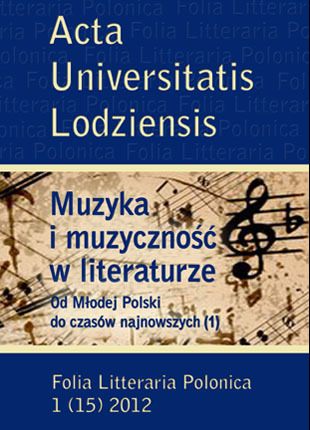Estrada i liryka. Szlagier w poezji międzywojennej
DOI:
https://doi.org/10.18778/1505-9057.15.09Abstrakt
In the essay the author enquires into the references to popular song in the lyric poetry of the first decades of 20th century, treating the birth of the popular music as the beginning of perceiving a hit single as the integral piece meant to be shown to the public. The researcher asks about acceptability and, eventually, the consequences of the artistic flirt of highbrow literature with egalitarian word-music tradition. Moreover, the author shows various scenario of treating hit song impulses, beginning with total ignorance shown by Young Poland artists (Jan Kasprowicz, Bolesław Leśmian, Leopold Staff), through the separation of serious creativity from stage gainful employment, as in the case of Skamander members fearing being given the label of cabaret entertainers (Julian Tuwim, Antoni Słonimski or Marian Hemar), until the liquidation of barriers between serious and jocular muse domains, as in Konstanty Ildefons Gałczynski’s lyric poetry. In this article, there are dozens of allusion, quotations, paraphrases, all invoking not only the most popular hit singles of the Interbellum, but also songs which were less known and therefore nowadays seem to be more difficult to identify. The list of the poets is extended by such personages as Bruno Jasieński, Maria Pawlikowska, and finally Czesław Miłosz.Pobrania
Brak dostępnych danych do wyświetlenia.
Pobrania
Opublikowane
2012-01-01
Jak cytować
Łuszczykiewicz, P. (2012). Estrada i liryka. Szlagier w poezji międzywojennej. Acta Universitatis Lodziensis. Folia Litteraria Polonica, 15(1), 105–113. https://doi.org/10.18778/1505-9057.15.09
Numer
Dział
Articles
Licencja

Utwór dostępny jest na licencji Creative Commons Uznanie autorstwa – Użycie niekomercyjne – Bez utworów zależnych 4.0 Międzynarodowe.











